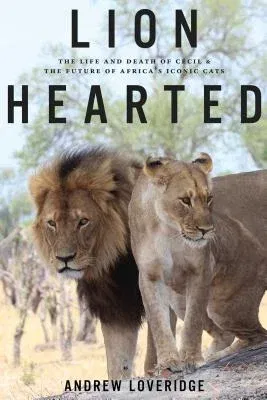"Until the lion has its own storyteller, tales of the lion hunt will
always glorify the hunter." --Zimbabwean proverb
In 2015, an American hunter named Walter Palmer shot and killed a lion
named Cecil. The lion was one of dozens slain each year in Zimbabwe,
which legally licenses the hunting of big cats. But Cecil's death
sparked unprecedented global outrage, igniting thousands of media
reports about the peculiar circumstances surrounding this hunt. At the
center of the controversy was Dr. Andrew Loveridge, the zoologist who
had studied Cecil for eight years. In Lion Hearted, Loveridge pieces
together, for the first time, the fascinating life and murky details of
this beloved lion's slaying.
In the tradition of Born Free and Gorillas in the Mist, Lion
Hearted chronicles Loveridge's long acquaintance with a host of
charismatic lions that his team has tracked, often from birth to death.
Born and raised in Zimbabwe, Loveridge learned to love predators at the
knee of his father, an eminent herpetologist who stored baby crocodiles
in the family bathtub. After earning his doctorate at Oxford, he seized
an invitation to study the lions of Zimbabwe's Hwange National Park.
There he meets Stumpy Tail, who, despite her name, has the dignity of
the Queen of the Animal Kingdom; Dynamite, a venerable coalition leader
who, muscled out by younger males, sets off on an incredible
thirty-seven-day, 137-mile journey to find a new home; and Kataza, who
escapes another lion's claws, and whom Loveridge twice saves from death
at the hands of humans. And, of course, there is Cecil. Dethroned in an
epic battle, he forms an alliance with a former rival. He also becomes a
favorite of photographers and tourists--until the fateful night when a
Minnesota dentist and his hunting guide entice the trusting cat with a
free meal.
Loveridge unravels the complexities of lion society and the dangers the
cats face both within their ranks and from the outside world. Despite
their ruthless reputation, lions can form deep emotional bonds--females
live in prides, a sisterhood of mothers, daughters, sisters, and aunts
that can exhibit military precision when hunting in formation; males
band together in coalitions to vie for control of territory and the
female prides. They also display a wide range of emotional behavior,
including mourning the loss of their mates, partners, and cubs.
Africa's lion population is estimated to have shrunk by 43 percent in
the last twenty years. There may now be as few as 20,000 wild lions
across the entire continent--far fewer than the number of elephants.
While deploring the killing of lions for sport, Loveridge does not
believe that banning trophy hunting, by itself, will halt the decline of
Africa's lion populations. He sees greater threats in human population
growth, the loss of habitat to agriculture, and the illegal trade in
lion body parts for use in traditional medicines. And he offers concrete
proposals for averting the lion's extinction.
More than a gripping detective story, Lion Hearted is an exploration
of humanity's relationship with the natural world and an attempt to keep
this majestic species from disappearing. "Lions are one of the most
beloved animals on the planet," Loveridge observes. "They are the
national symbol of no fewer than fifteen countries. . . . Surely, we can
think of a better way to save the wild animals we love besides killing
them."

